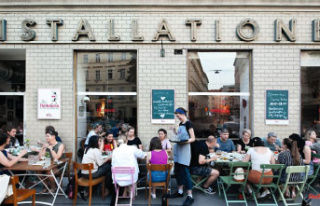For decades, the descendants of the Adlon family of hoteliers have wanted the world-famous hotel back, which was expropriated from their ancestor Hedwig Adlon. The dispute is also about the role of the family under National Socialism. According to the court, however, something else is important.
The Adlon family is not entitled to any compensation for the expropriation of the famous luxury hotel at the Brandenburg Gate. That was decided by the administrative court in Berlin. Thus, the heirs were initially unsuccessful in their attempt to have an earlier procedure from 1997 for the return transfer taken up again. From the point of view of the plaintiffs, there was new evidence that the Adlons themselves had been victims of Nazi persecution. The court did not see sufficient evidence for this. The world-famous hotel was "instrumentalised" by the Nazis. However, the hotel operators have not been completely squeezed out of their property.
Hedwig Adlon, the last owner of the hotel before 1949, was expropriated in November 1949 without compensation. This was a consequence of the entry in the so-called List 3, with which the "Law on Confiscation of Assets of War Criminals and Nazi Activists" was implemented. Hedwig and her husband Louis were accused of joining the NSDAP in 1941 and agreeing to the hotel being run by Nazi activists.
As early as 1997, Hedwig Adlon's community of heirs applied for the retransfer of the property. However, the competent state office rejected this, pointing out that the retransfer was ruled out because of "expropriation on the basis of sovereignty of the occupation" - the former Soviet Union had expropriated it. In 2019, the heirs then applied for the proceedings to be resumed.
They said they believed that new evidence showed that their ancestors had been wrongly included in List 3 as Nazi activists. Rather, they were themselves victims of National Socialist persecution and had been "actually expropriated" before 1945. However, the authority rejected the so-called reopening application, whereas the heirs complained to the administrative court - but without success.
The court ruled that the refusal was correct. There is some evidence that the evidence named by the Adlon heirs should not be regarded as "new". In addition, they were not submitted in time. The question of whether Hedwig Adlon was rightly or wrongly included in List 3 in 1949 is also irrelevant because of the expropriation that took place on the basis of the sovereignty of the occupation.
The Federal Constitutional Court has repeatedly confirmed that Nazi property confiscated by the former Soviet Union may not be returned.
According to the administrative court, the community of heirs also has no right to a finding that they had already lost their assets for racial or political reasons before 1945 and were therefore entitled to demand proceeds for the Adlon property sold in 1994. The court explained that there was no "necessary complete and final displacement of the Adlons from the position of owner". In addition, the Adlons were not politically persecuted because their alleged anti-Nazi attitude "remained completely unrecognized".
The verdict is not yet legally binding. Felix Adlon, who represents the community of heirs, announced further legal steps. "Our path does not end here," he said after the verdict was announced. He is the great-great-grandson of hotel builder Lorenz Adlon.












